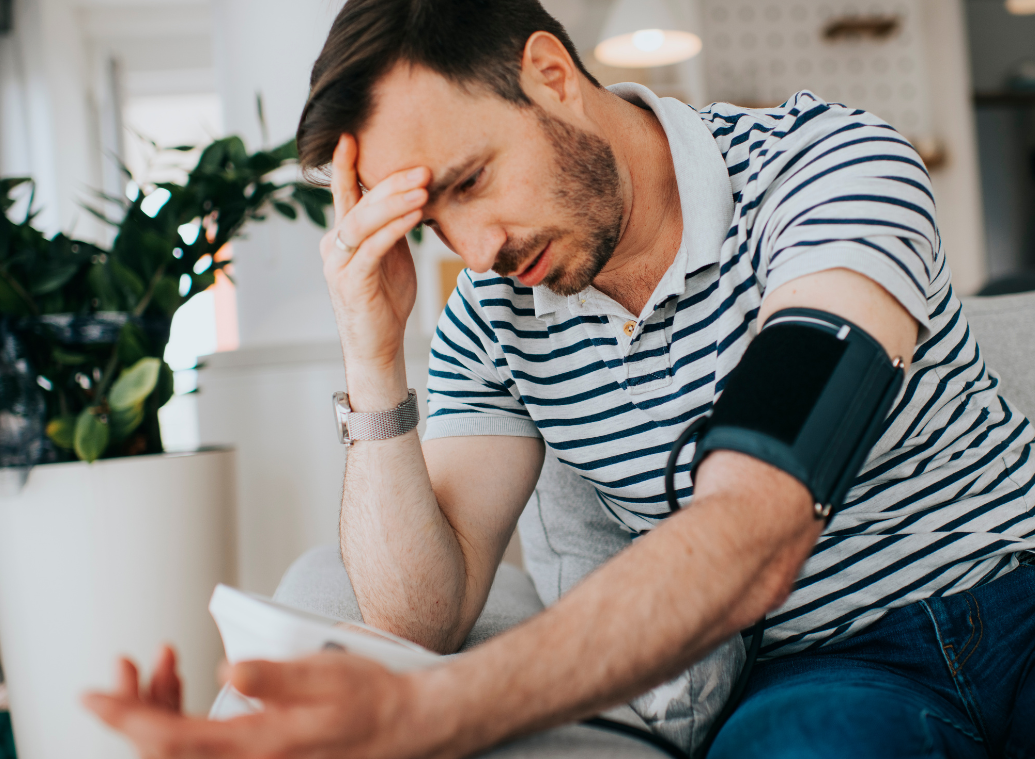Coronavirus and Hypertension
Published 31 Mar 2020 • Updated 7 Apr 2020 • By Camille Dauvergne
Hypertension (high blood pressure) affects around 14.4 million people in the UK. This silent but dangerous condition has been listed by the World Health Organization (WHO)as a risk factor for complications following an SARS-CoV2 coronavirus infection.
What does this mean in practice? Why is the risk higher than for the general population? What precautions should be taken? We tell you everything!

Are all people with high blood pressure at risk?
No, not all cases of high blood pressure are considered to be at risk of developing serious complications from coronavirus infection.
Only complicated hypertension cases are an issue. What do we mean by “complicated”? We are referring to cases of high blood pressure which have resulted in a stroke, a myocardial infarction or heart failure. In these cases, the risk is not due to high blood pressure itself, but to the heart or brain damage caused by these events. As these organs are already weakened, they are less resistant to an infection such as COVID-19.
“Simple” high blood pressure cases, meaning cases which have not resulted in a stroke, MI or heart failure and which are stabilised by a course of antihypertensive medication, do not present a higher risk of complications than the general population.
Is the risk of complications related to the coronavirus increased if I have multiple cardiovascular risk factors?
According to Professor Gérard Helft, a cardiologist at the Pitié-Salpêtrière Hospital in Paris, it has not been shown that the risk of complications increases with the number of cardiovascular risk factors. As long as hypertension and cardiovascular risk factors have not led to events such as those mentioned above, the risk is the same as for the general population.
It is important to note that other factors such as age (>70 years old) may increase the risk of complications.
Does my high blood pressure medication need to be adjusted as a preventive measure? What about if I become infected?
The most important recommendation is not to alter or stop taking your blood pressure medication without consulting a physician, either for preventive purposes or in the event of coronavirus infection.
In general, discontinuation or modification of blood pressure medications is not recommended. If you have any questions about your prescribed treatment, call your doctor or cardiologist! If you need to see him or her in person, opt for teleconsultation if possible.
High blood pressure treatments do not diminish your immunity. According to Professor Helft, studies are currently underway on a possible link between inhibitors of the renin–angiotensin–aldosterone system (such as Cozaar, Kenzem, Capoten or Enalapril) and a worsening of COVID-19 infection, but so far no scientific results confirm this correlation. Therefore, the recommendations are not to change or stop these treatments if you take them.
I’m taking aspirin in the long-term, what should I do?
After a myocardial infarction or stroke, aspirin is prescribed as an anti-platelet agent (it thins the blood) to reduce the risk of recurrence. This is achieved with low doses of aspirin, which are much lower than anti-inflammatory doses.
It is therefore important not to stop your aspirin treatment, as it does not present any danger concerning the coronavirus. On the other hand, stopping aspirin exposes you to a high risk of a recurrence of heart attack or stroke.
Can anxiety and stress make my high blood pressure worse? Or make my blood pressure high when it's not?
The endless news cycle, self-isolation, decreased activity and/or income... These are all a major source of stress and anxiety. This can trigger spikes in blood pressure in both hypertensive and healthy patients. However, it is important to remember that isolated readings showing high blood pressure do not indicate that your hypertension has worsened or has lead to a diagnosis of high blood pressure.
To do this, the doctor must analyze the average of your blood pressure measurements and only he or she can make the initial and follow-up diagnosis. It is therefore important not to panic at the sight of a reading that is higher than usual, what counts is the average of your readings!
Do not hesitate to contact your doctor or cardiologist if you have any questions about your blood pressure levels.
This self-isolation and the current situation in general is increasing my stress level, how can I lower it?
Although stress and anxiety do not spontaneously trigger high blood pressure, if they are not controlled, they are not beneficial to your overall health.
The first thing is to find the right information to reassure you, especially from your doctor. Carenity also offers many articles based on official recommendations and sites for you to consult and help get you informed!
It is important to maintain physical activity during the isolation as it will regulate your stress in a positive way, in addition to maintaining your muscles, joints and metabolism. So make sure you do half an hour of physical activity a day, even if it is moderate!
You can also try meditation or yoga, which helps regulate your breathing and focus on the positive to reduce your anxiety level.
Take time to relax during the week, alone, as a couple or with your family, by doing something you enjoy (reading, cooking, watching a good film, gardening, etc.).
In the event that I develop a COVID-19 infection, can I take hydroxychloroquine if I have arrhythmia in addition to high blood pressure?
In the UK, hydroxychloroquine is available only by prescription. At this time, hydoxychloroquine is not licensed to treat COVID-19 related symptoms or prevent infection. There is no formal contraindication to taking hydroxychloroquine in case of arrhythmia, however this drug is not recommended by cardiologists following several observed cases of rare but serious arrhythmia.
Hydroxychloroquine is associated with an increased risk, following observations in several large studies, of serious cardiac arrhythmia and conduction disorders. These disorders occur most often as a result of drug interactions and/or risk factors such as hypokalaemia.
Medications that are contraindicated are:
- Citalopram, Escitalopram (Cipramil®, Cipralex®, Ciprapine®, Ciprotan®, Lexapro®, etc.)
- Hydroxyzine (Atarax®, Ucerax®, etc.)
- Domperidone (Motilium®, etc.)
Drugs that are not recommended and should only be combined under the previously mentioned monitored conditions are :
- Class IA and III antiarrhythmic drugs,
- Tricyclic antidepressants
- Certain antipsychotics
- Certain anti-infectious agents: macrolides including azithromycin (Zithromax®, etc.), fluoroquinolones, etc.
- Methadone
Clinical trials are ongoing to test chloroquine and hydroxychloroquine as an agent in the treatment of COVID-19 or to prevent COVID-19 infection. These clinical trials are still not completed, so no conclusions have been reached on the safety and effectiveness of this medicine to treat or prevent COVID-19. Until clear, definitive evidence that these treatments are safe and effective for treating COVID-19, they should only be used as prescribed for the conditions for which they were prescribed.
A little reminder of the recommendations:
- Do not change or stop your high blood pressure medication without the advice of your doctor or cardiologist!
- Implement proper barrier gestures
- Regularly consult the government's recommendations
- Avoid leaving the house if you have symptoms such as a cough or fever.
- Use the NHS 111 online service or call 111 if symptoms worsen (severe respiratory discomfort).
- Always be alert for signs of myocardial infarction (very intense chest pain/pressure, lasting at least 20 minutes, which can radiate to the throat, jaws, shoulder, arms, sometimes the wrists) and stroke, call 999 in case of symptoms!
Was this article helpful? Do you have any other tips to share with the community?
Take care and stay home!
Sources :
- Emission Allô Docteurs “Hypertension et coronavirus : toutes vos questions”, diffusée le 27/03/2020
- https://www.fedecardio.org/Les-maladies-cardio-vasculaires/Les-pathologies-cardio-vasculaires/linfarctus-du-myocarde
- https://www.fedecardio.org/La-Federation-Francaise-de-Cardiologie/Actualites/coronavirus-covid-19-recommandations
- https://eurekasante.vidal.fr/medicaments/bon-usage/paracetamol-aspirine-ains.html?pb=aspirine
- https://www.gov.uk/government/news/chloroquine-and-hydroxychloroquine-not-licensed-for-coronavirus-covid-19-treatment
- https://www.rfcrpv.fr/hydroxychloroquine-et-azithromycine/
3 comments


 Facebook
Facebook Twitter
Twitter




